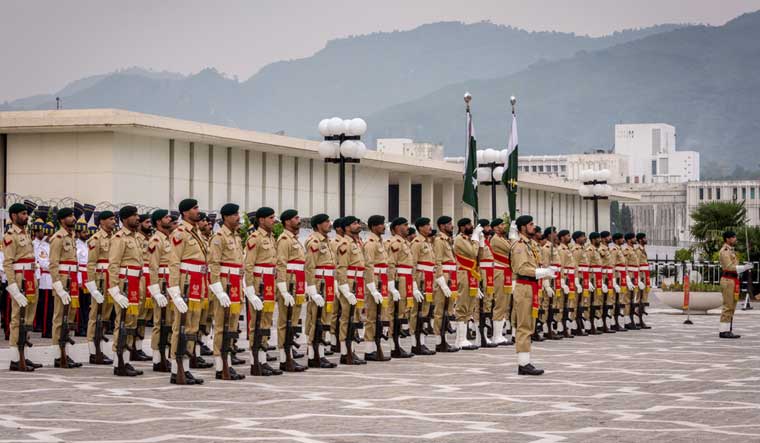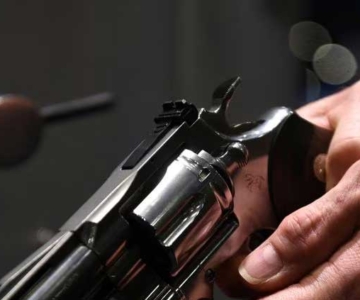Sovereignty is the flavour of the month in Pakistan. Since the capture and questionable assassination of Osama Bin Laden, the Pakistani discourse has been dominated by endless references to national sovereignty, honour, defence and pride. This jolt to the Pakistani state of mind has come at a time when media is relatively free, a vibrant boundless Internet flashes news by the second and there is quasi-democracy straddling between opportunism of the political elites and tunnel visions of the permanent ruling class: the security establishment.
That the Americans would conduct a surgical strike in the heart of military complex and ‘eliminate’ the poster-boy of Islamism has perturbed the right wing and their patrons who had worked hard for decades to construct a xenophobic, paranoid mindset justifying the country’s military machine. Arguments on incompetence or complicity are lethal for the uber-nationalist narratives; and hence the dilemma, perhaps the greatest of crises for the right wing in Pakistan.
A step forward
The Parliament has had a joint session, which ended up passing a resolution with the calls for an independent commission, thereby scuttling the initial plan of conducting an army-led investigation endorsed by the ruling coalition. This is a step forward by all accounts and the leaked snippets from the joint session reveal that there was some degree of hard talk between the khakis and the civvies even if it was personalised and, in some cases, devoid of the larger political context.
Many steps backward
The joint session of the Parliament, however, could not come up to the public expectations in asking some more pressing questions. For example, what was Mr Bin Laden doing in Abbottabad or Haripur for that long? Furthermore, the larger questions of reviewing the Afghanistan and India policies, the strategy to fight terrorism hardly featured in the joint decree. Instead, the easy route was adopted by espousing the Anti-American cause. We shall shoot the drones the next time it happens, thundered the politicians without asking for the secret deals made between Musharraf administration and the US counterparts, especially the Central Intelligence Agency. The emotive and serious issues of drone attacks require a national policy consensus. Instead, there is blame game: the military passes the buck to the civilians and the civilians, in turn, quarrel among themselves who can appear to be more anti-American.
“Until access is provided to independent monitors, it is difficult to sift fact from faction and to make sense of the facts on the ground”, says Ali Dayan Hasan, Pakistan’s representative for the Human Rights Watch. He adds, “The rhetoric on this matter (drones) from all sides notwithstanding, Pakistan’s political and military class is complicit in this affair”. The failure to achieve a consensus on an anti-terrorism strategy and contours of partnership with the US continues to rattle and misinform the national discourse on militancy.
Mainstream politics and the holy cow
Despite the disappointing proceedings of the Parliament, Nawaz Sharif, Quaid of the Pakistan Muslim League-Nawaz (PML-N) has taken a radical position on the role of Army and intelligence agencies in Pakistan’s politics. He cited the appropriation of ‘policy’ by the secret agencies and repeated military interventions as the cause for Pakistan’s mess. At the same time, his criticism of the civilian government has been measured and cautious with a clear view not to upset the ‘system’ in which his party is a stakeholder and a long-term player. His bold statement indicating that India is not our enemy has also been lauded by many and is in direct conflict with the security establishment’s India-centric worldview.
No consensus on taking on the military
On civil-military imbalance, a wider political compact is needed. The ruling coalition comprising the Pakistan People’s Party (PPP), the Awami National Party (ANP), the Muttahidda Qaumi Movement (MQM) and PMLQ have thrown their weight behind the Army in this game of wits. Their objective is survival in office and smooth sailing until the next election. As Ali Dayan Hasan puts it, “Nawaz Sharif will gain in short term popularity but in the long term the impact of his politicking will remain minimal in the absence of a broader political compact to confront the military”. Hasan echoes the various voices within Pakistan’s media and civil society that “PPP’s position in this matter has been a disappointment and it remains to be seen whether the adoption of a pro-military stance will pay the dividend that Mr Zardari seeks by way so security of tenure.”
In a way, this is not a surprising state of affairs. Pakistani political elites have time and again displayed their propensity to focus on short-term retention of power and patronage in favour of a long-range strategy to deal with the embedded imbalances. The last effort that took place via the Charter of Democracy (2006) was scuttled due to the typical power play between the PPP and PML-N.
Remembering CoD
It would be worthwhile to remind the major political parties that not long ago they had signed a vital agreement. It is important to remind the readers of what the CoD entailed:
“Clause 32. The ISI, MI and other security agencies shall be accountable to the elected government through Prime Minister Secretariat, Ministry of Defence, and Cabinet Division (DCC) respectively. Their budgets will be approved by DCC after recommendations are prepared by the respective ministry. The political wings of all intelligence agencies will be disbanded. A committee will be formed to cut waste and bloat in the armed forces and security agencies in the interest of the defence and security of the country. All senior postings in these agencies shall be made with the approval of the government through respective ministry.
Clause 33. All indemnities and savings introduced by military regimes in the constitution shall be reviewed.
Clause 34. Defence budget shall be placed before the parliament for debate and approval.
Clause 35. Military land allotment and cantonment jurisdictions will come under the purview of defence ministry. A commission shall be set up to review, scrutinise, and examine the legitimacy of all such land allotment rules, regulations, and policies, along with all cases of state land allotment, including those of military urban and agricultural land allotments since 12th October, 1999 to hold those accountable who have indulged in malpractices, profiteering, and favouritism.
The truth is that both the major parties, PPP and PMLN, reneged on this important agreement. When the PPP-led government tried to attack the political wing of the ISI, the PMLN opposed it tooth and nail, calling it an attack on national institutions. The PPP later imposed Governor’s rule and dislodged the PML-N government in the Punjab; and the rest as they say, is history.
Aid politics
The US has been providing substantial amounts of military assistance since last one decade. US military aid to Pakistan was approximately $4.0 billion from fiscal years (FY) 2002 to 2010. Security Assistance support was $462 million in FY 2008, $884 million in FY 2009, and $1,114 million in fiscal year 2010. In addition, Coalition Support Fund (CSF) reimbursements for expenses incurred by Pakistan for its assistance to US military operations from 2001 to early 2011 have been roughly $8.88 billion. Under the Kerry Lugar Berman aid programme only $300 million have been disbursed against the target of nearly $3 billion.
This asymmetry is a cause of concern. However, the recent decision by the Punjab Government to shun US civilian assistance is a political one and needs to be revised. Once again, political posturing is dominating the need for a genuine debate on what kind of aid we need. If anything, the political players should be asking for a review and accountability of direct military aid rather than undoing the projects that may lead to better services for ordinary citizens.
It is never too late to move towards the correction of civil-military imbalance in Pakistan. Democratic development by its very nature is an evolutionary game. A staged and negotiated civil-military compact can bring change. Rhetoric and posturing might just be counterproductive when there is actually a war in the neighbourhood, insurgencies across the country and when a major blow has been dealt to military’s image at least on the domestic front. It is necessary to rationalise military expenditure, introduce accountability measures and for a change initiate civilian oversight over national security issues.
For this to happen, the political elites need to understand their historic role at this particular moment. They have to be persistent and cautious. Three immediate steps can set the way forward. First, the independent commission should investigate into the OBL raid and affix responsibility. This commission should be monitored by the defence committee, which already includes all the representatives of various political parties. Making its findings public would be most vital. Secondly, debate on the mechanisms to make the army expenditure more open and transparent should take place in consultation with the chiefs of the armed forces. However, the political parties will need to debate this first in the parliamentary committees; and then move towards an intra-state dialogue.
Thirdly, an open debate on the Afghanistan and India policies, interrelated for reasons well-known, ought to take place. Such debates should be exhaustive entailing an active role of Cabinet’s Defence Committee in policymaking and negotiations with the US and other regional players. It is vital that the political parties avoid grand public statements on these issues until they have achieved a consensus of sorts. Such historic moments simply cannot be squandered. At the end of the day, it is also in the interest of the military to redeem its image and undo some of the historical mistakes that it has made. The initiative lies with the political parties of Pakistan. Even if they were to make small gains, they may be able to partially fulfill their mandate of ‘fixing’ Pakistan’s governance.
The writer is a policy adviser and editor based in Lahore. His writings are archived at www.razarumi.com. He maintains two group blogs: Pak Tea House and Lahore Nama. Email: razarumi@gmail.com



